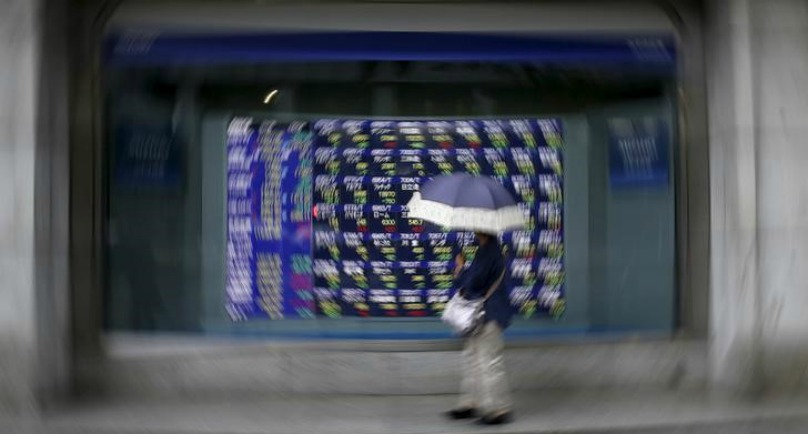Image: A woman holding an umbrella looks at an electronic stock quotation board outside a brokerage in Tokyo September 8, 2015. REUTERS/Issei Kato
By Christopher McCall, Hideyuki Sano and Lionel Laurent
SYDNEY/TOKYO/PARIS (Reuters) – Global stocks are set for a short-term sell-off on Monday after Islamist militants launched coordinated attacks across Paris that killed 129 people, but few strategists expect a prolonged economic impact or change in prevailing market directions.
If anything, any initial damage to economic confidence, tourism and trade within Europe will likely reinforce the European Central Bank’s resolve to ease monetary policy further next month, they reckon. That will keep pressure on the euro exchange rate and support other European asset markets.
French financial markets will be open as usual on Monday, stock and derivatives exchange Euronext said on Saturday.
With many Parisian restaurants and shops shut on Saturday and Sunday, some local analysts expected any French equity reaction to be more visible than after January’s attacks against the Charlie Hebdo satirical magazine and a Kosher supermarket.
“Stocks that are angled toward consumer goods or tourism, notably the luxury industry with the Christmas season, could be affected,” said IG France analyst Alexandre Baradez.
“The January (attacks) were different, they were more targeted. Here they were aiming at an entire population,” he added. “There may also be a purely psychological effect that pushes investors to stay on the sidelines until more clarity emerges.”
Mohamed El-Erian, Chief Economic Adviser at Allianz, said, “With the horrible tragedy leading to some short-term restraint to French GDP, equity markets are likely to open lower with both government yields and the euro falling.”
Concern about similar attacks beyond France and tensions surrounding a stepped-up Western military response to actions of Islamic State point to some ripple effect around world markets.
“These Paris terrorist attacks and the larger scale of this attack could have a meaningful negative impact on the travel and tourism sector,” said Robert T. Lutts, chief investment officer at Cabot Wealth Management in Salem, Massachusetts.
France has the largest number of tourists in the world and the sector accounts for almost 7.5 percent of GDP.
If increased national security causes trade friction, longer-term commercial effects also “bode ill for the euro,” said Brian Battle, director of trading at Performance Trust Capital Partners in Chicago.
“France closed the borders. For how long and what degree will determine the effects,” he said. “The question is will other countries follow this policy, maybe as a political cover to impede immigration.”
Outside France, few expect a jolt as significant as the hiatus after 2001’s attacks that destroyed the World Trade Centre in New York City.
In early foreign exchange markets trading, the euro was slightly lower against the dollar and yen. Markets in the Middle East, which trade on Sunday, were hit hard, though part of that decline was due to recent falls in oil prices.
Analysts trying to put the event in some historical context say prior events like this in Europe over the past 15 years tended not to have any durable market or economic effects.
“As horrific as these events are – and this is truly awful – economic activity does tend to be pretty resilient,” said Howard Archer, chief UK and European economist at IHS Global Insight. He noted that the UK, Spain and France have all seen their economies “little damaged by terrorist atrocities in the past.”
SAFETY AND POSITIONING
One sector that could see a boost: defense. The sector is already doing better than U.S. equities as a whole, and “the prospect of more military action in Syria may help this group in the week ahead,” said Nicholas Colas, chief market strategist at the ConvergEx Group in New York.
“While the attack was in Europe, stocks all around the world will see pressure on Monday,” he said. “The typical “risk off” trade is out of global stocks, and into global sovereign debt and the U.S. dollar.”
Traditional safety plays into assets such as U.S. Treasury bonds would also go against the prevailing market trend of discounting an interest rate rise from the Federal Reserve next month. With few expecting the fallout from the attack to be big enough to affect Fed decision making, any Monday move will likely be short lived.
U.S. 10-year Treasuries notes
One reason for a possible volatile move into Treasuries is because the Fed rate hike anticipation has prompted heavy short positions in the 10-year Treasury. That could exacerbate any move into safe-have government debt.
Analysts at Citi say just the initial shock of the attacks may challenge extremely leveraged plays – such as heavy short positions in the euro or oil futures. But there was little reason to view that unwind as anything other than temporary.
“The market is heavily short euro and concerns are high any risk will trigger a short squeeze,” Citi analysts told clients. “We don’t think it will – and would sell into one if it appears. The attacks do not undermine the initial reasons for being short euro – or reduce the possibility of (ECB) action.”
While news of the attacks hit after markets closed on Friday, S&P 500 Index futures
“If this had happened during market trading hours there could have been a panic but markets had a weekend to digest all the information,” said Eiji Kinouchi, chief technical analyst at Daiwa Securities in Tokyo.
(Additional reporting by Tariro Mzezawa, Rodrigo Campos and Jennifer Ablan in New York; Nigel Stephenson in London; Writing by Mike Dolan and Lincoln Feast; Editing by Raissa Kasolowsky and Christian Plumb)
Copyright 2015 Thomson Reuters. Click for Restrictions.


